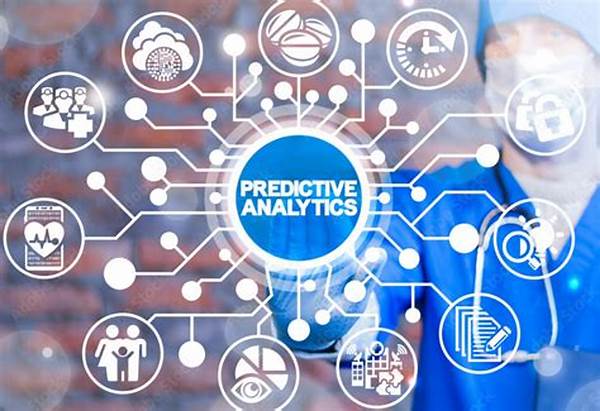In the ever-evolving landscape of digital marketing, the application of predictive analytics has emerged as a crucial tool for businesses striving to stay ahead of the competition. By leveraging vast amounts of historical data, predictive analytics offers marketers the ability to forecast future trends, behaviors, and outcomes. Through complex algorithms and machine learning techniques, predictive analytics in digital marketing can provide valuable insights that enable marketers to tailor their strategies with remarkable precision, ultimately enhancing customer engagement and ROI.
Read Now : Personalized Learning Strategies For Students
The Role of Predictive Analytics in Transforming Marketing Strategies
Predictive analytics in digital marketing serves as a transformative force that enables marketers to anticipate customer needs and preferences with unprecedented accuracy. By analyzing historical data and identifying patterns, marketers can predict customer behaviors, such as purchasing trends, thereby allowing for a more personalized approach to marketing strategies. This capability not only drives more effective targeting and segmentation but also optimizes marketing campaigns, ensuring that resources are allocated to the most promising opportunities. Moreover, predictive analytics can significantly improve customer retention by identifying early warning signs of churn and facilitating timely intervention strategies. Consequently, the integration of predictive analytics in digital marketing not only enhances operational efficiency but also elevates the overall customer experience. As businesses continue to navigate the digital landscape, the strategic application of predictive analytics is poised to become a defining factor in achieving competitive advantage and sustainable growth.
Key Benefits of Predictive Analytics in Digital Marketing
1. Enhanced Customer Insights: Predictive analytics in digital marketing empowers businesses with a deeper understanding of customer behavior and preferences, facilitating more informed decision-making processes.
2. Optimized Resource Allocation: By identifying the most promising audience segments, predictive analytics enables marketers to allocate resources more effectively, thereby maximizing the return on investment.
3. Improved Personalization: The application of predictive analytics in digital marketing allows for personalized marketing messages, improving customer engagement and brand loyalty.
4. Increased Conversion Rates: Through predictive modeling, marketers can identify potential buyers and deliver tailored content, thereby increasing the likelihood of conversion.
5. Early Detection of Trends: Predictive analytics assists marketers in anticipating and capitalizing on emerging trends, keeping businesses ahead of the curve in the competitive market landscape.
Read Now : Creative Weekend Lesson Plans
Integration of Predictive Analytics in Digital Marketing Frameworks
The integration of predictive analytics in digital marketing frameworks necessitates a strategic approach that encompasses several key components. Firstly, data collection and management are paramount, as the quality and volume of data directly influence the predictive models’ performance. Businesses must ensure they have robust systems in place for gathering and storing relevant data from various channels. Secondly, the development of sophisticated algorithms is crucial to analyzing data patterns effectively. Machine learning models, for instance, can process large datasets to derive actionable insights that drive marketing strategies forward. This integration not only enhances decision-making processes but also aligns marketing initiatives with customer expectations, leading to improved outcomes. Implementing predictive analytics in digital marketing frameworks allows businesses to maintain a forward-thinking approach, ultimately ensuring long-term success in an ever-evolving digital environment.
Challenges and Solutions in Predictive Analytics Implementation
Despite its advantages, implementing predictive analytics in digital marketing presents several challenges. Data privacy concerns are paramount, as the collection and analysis of customer data need to comply with stringent regulations. Businesses must navigate these challenges by instituting robust data governance policies and ensuring transparency in data usage to build customer trust. Additionally, the integration of predictive analytics requires substantial technological investment and skilled data professionals capable of developing and refining predictive models. Investing in training and development of existing teams, or hiring expertise, can bridge this skills gap. Furthermore, the complexity of integrating predictive tools with existing marketing technologies can pose significant obstacles. However, with strategic planning, a phased implementation approach, and continuous evaluation and adjustment, businesses can overcome these challenges and harness the full potential of predictive analytics in digital marketing.
Strategic Applications of Predictive Analytics in Marketing
Strategic applications of predictive analytics in digital marketing manifest in various forms. One such application involves the refinement of customer segmentation processes, allowing marketers to cluster audiences based on predicted behaviors and preferences. This segmentation further informs the development of targeted marketing messages that resonate with different audience segments, thereby increasing engagement and conversion rates. Additionally, predictive analytics can streamline budget allocation by forecasting which channels are likely to yield the highest returns, ensuring that marketing investments are optimized for maximum impact. Another crucial application is in the area of content personalization, where predictive models determine the most relevant content for individual users based on historical interactions. This level of personalization fosters stronger customer relationships and enhances brand loyalty. The strategic application of predictive analytics in digital marketing not only refines traditional marketing practices but also propels businesses toward innovative, data-driven solutions.
Conclusion: The Future of Predictive Analytics in Digital Marketing
In conclusion, predictive analytics in digital marketing represents a pivotal advancement in how businesses approach their marketing strategies. As data continues to proliferate, the reliance on predictive models will only intensify, shaping the way marketers understand and engage with their customers. By providing granular insights into customer behavior and market trends, predictive analytics facilitates more strategic, personalized, and efficient marketing efforts. However, to fully realize its potential, businesses must navigate challenges such as data privacy, technological investments, and skill gaps. As these barriers are addressed, predictive analytics will undoubtedly lead the charge in driving the future of digital marketing. The integration of predictive analytics in digital marketing is expected to redefine the industry, setting new standards for customer interactions and business growth.
